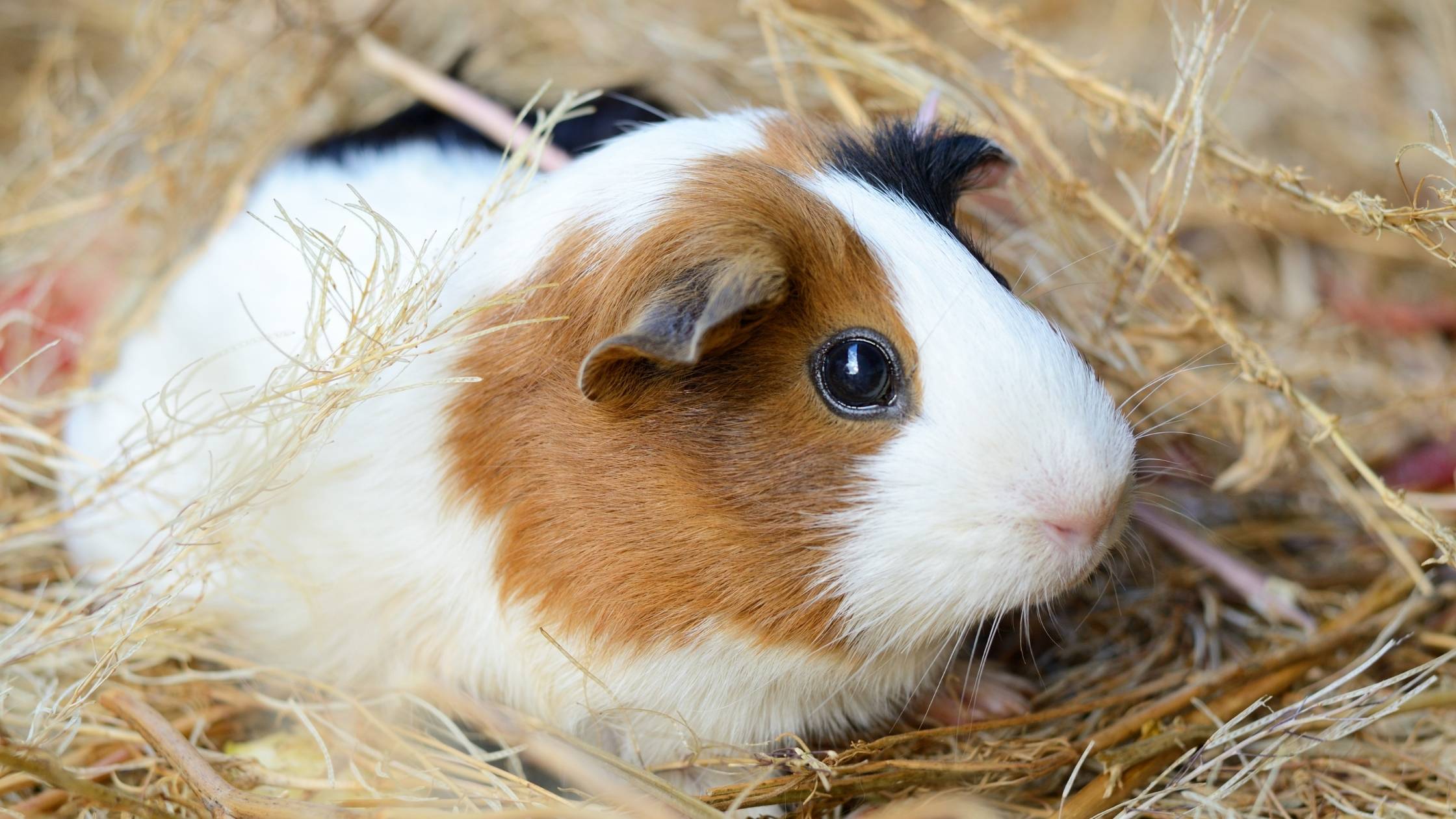Last Updated on 08/20/2021 by Veronica Jones
Watermelon is the easy answer if you’re craving for a fruit to satisfy your hunger and thirst. An article in The New York Times titled watermelon as the best summer fruit, but usually, it’s available year-round so you won’t have a hard time finding it in the market. So, watermelon is clearly a great, refreshing snack for humans, but can guinea pigs eat watermelon, too? Let’s find out…
Can guinea pigs eat watermelon?
Yes, absolutely. Guinea pigs can eat watermelon. Watermelons have rich nutritional value and they contain vitamin C. On the other hand, guinea pigs need 30-50 mg of vitamin C in their daily diet. The facts speak for themselves and indeed, these two are definitely a match made in heaven.
In general, though, do guinea pigs like watermelons? Well, just like humans, guinea pigs can have their own preferences when it comes to food. Some guinea pigs will only like a certain part of watermelon while others will badly react if you feed it to them. The secret key to knowing if your guinea pig likes watermelons or not is by introducing a tiny cube of the fruit and see how it will take it.
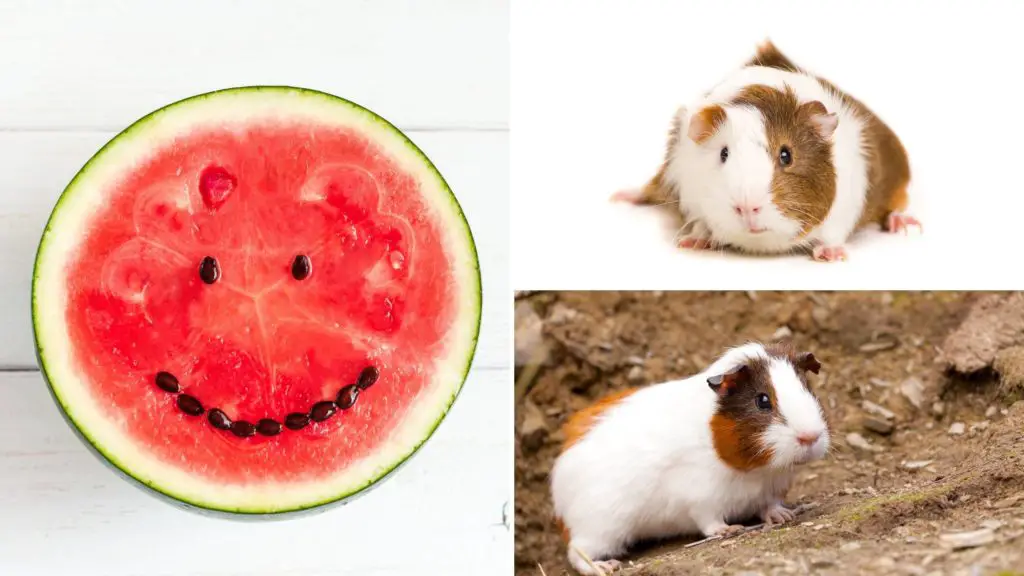
If your guinea pig behaves badly towards eating watermelon, don’t force it and consider other food instead. You can also try giving them the fruit some other day and see how it reacts. If your guinea pig loves watermelons, then you should also start learning the limitations of feeding watermelons to your furry friend.
Is watermelon good for guinea pigs?
Watermelon is a healthy treat for your guinea pig which contains vitamin C. Guinea pigs essentially need vitamin C because unlike humans, they can’t produce it naturally. You can give vitamin C to your guinea pig in the form of supplements or fruits. Vitamin C helps in the development of their teeth and immune system. It also fights one of the most common diseases among guinea pigs which is called scurvy.
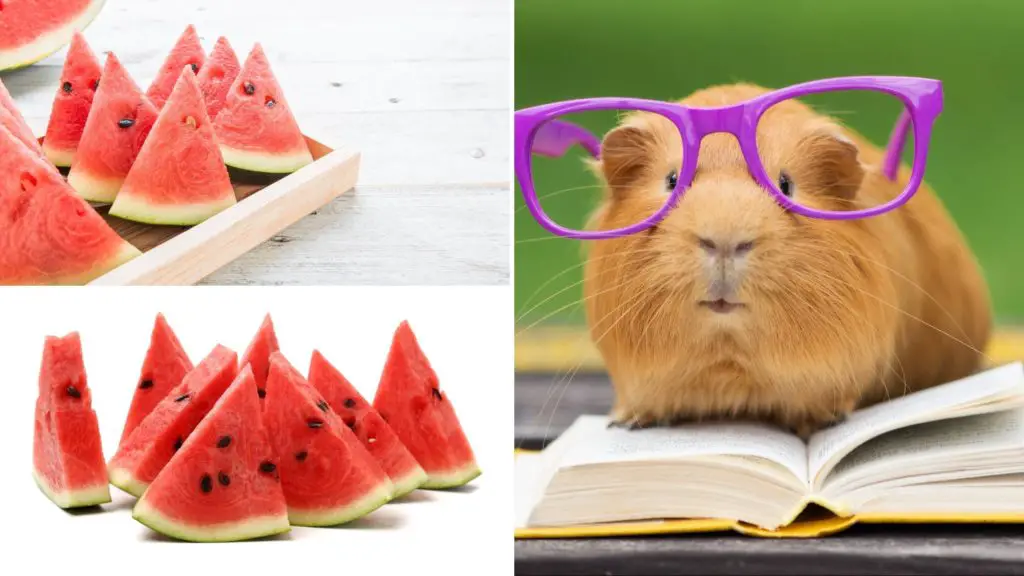
Aside from vitamin C, watermelon also provides other vitamins and minerals that are important in maintaining good health for guinea pigs. These include vitamin A, vitamin B6, vitamin B1, calcium, potassium, and magnesium.
Watermelon is a very good source of water for hydration which goes back to the reason why it is a top fruit choice during summer. It also gives fiber which can help your guinea pig prevent constipation.
Can guinea pigs have watermelon everyday?
Are guinea pigs allowed watermelons every single day of the week? Definitely not. We have grown up thinking that anything too much is dangerous. The same principle applies when it comes to feeding watermelons to guinea pigs. It is not safe and here are the most valuable details that you need to take note of.
Related Post: The 5 Best Guinea Pig Foods
A guinea pig’s daily diet should only be composed of 10% mixed vegetables and fruits while the 90% should come from guinea pig food, grass and hay. The most suitable and safest amount of watermelon to give your guinea pig is around ¼ to ½ cup of small, bite-size melon chunks combined with other fresh vegetables. Remember to give the watermelon snack to your guinea pigs no more than three times a week and not in two consecutive days.
The reason behind the proportions and numbers is that watermelons contain high amounts of sugar and guinea pigs are extra sensitive to sugar. These little pets might look like they’re sweet-toothed creatures but you need to watch out for the amount of watermelon you are feeding them. Too much sugar can easily escalate to stomach pain and diarrhea for your guinea pig. What’s even worse are diseases such as diabetes or body conditions like obese which might make your guinea pig even cuter but remember that it also imposes threat to its health.
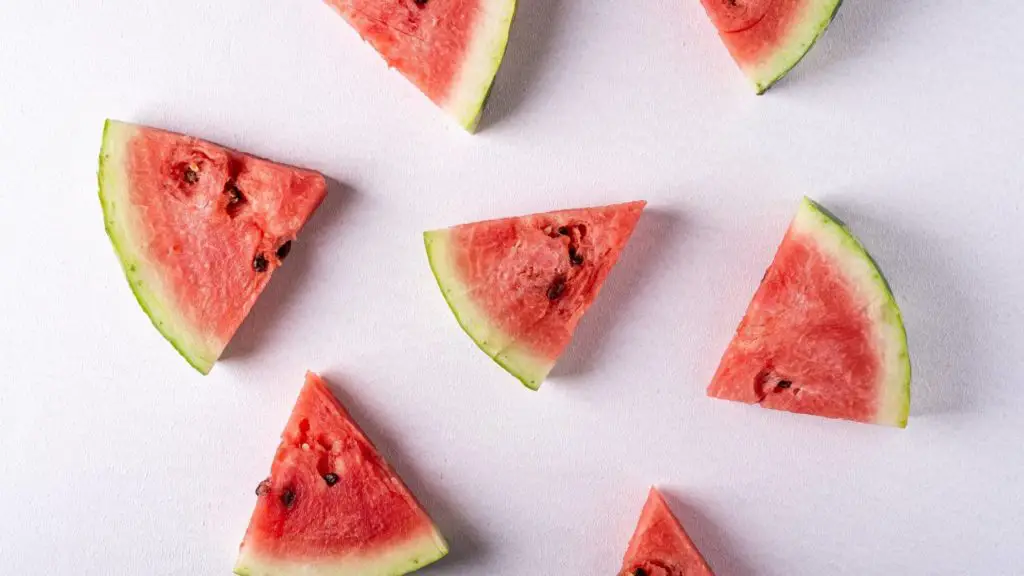
It’s also better to buy organic watermelons which have not been subjected to pesticides and chemicals as much as possible. However, in the modern world where almost all crops are treated with pesticides and chemicals, you might have a hard time finding organic food for your pets. In that case, just keep in mind to thoroughly wash the watermelon to get rid of any chemical residue before rewarding it to your pet.
In contrast to fresh watermelon, you might also want to look out for any watermelon portions which remain untouched by your guinea pig. If your guinea pig just ignored the watermelon for over twelve hours, it’s already safe to dispose of it already to avoid feeding your pet something that’s already unsafe.
Can guinea pigs eat watermelon rinds?
You’ve already learned that guinea pigs can absolutely eat the actual watermelon which pertains to the pinkish to reddish, tender part of the fruit. What about other parts? Let’s go and find out.
The watermelon rind is the tough, exterior skin of the fruit but it also contains the most nutrient punch. It is a great source of vitamin A, potassium, zinc, iodine, and enzymes that aid in digestion. The catch is, though, you have to smartly choose the certain parts of the rind or skin to give your guinea pig.
The outer green part tends to be the hardest rind to digest so you can leave it aside for the safety of your guinea pig. The white inner part is quite chewable and will make a good snack for your guinea pig. Just always remember the rule of thumb, or should I say, proportions when it comes to the amount of fruit you can feed your guinea pig.
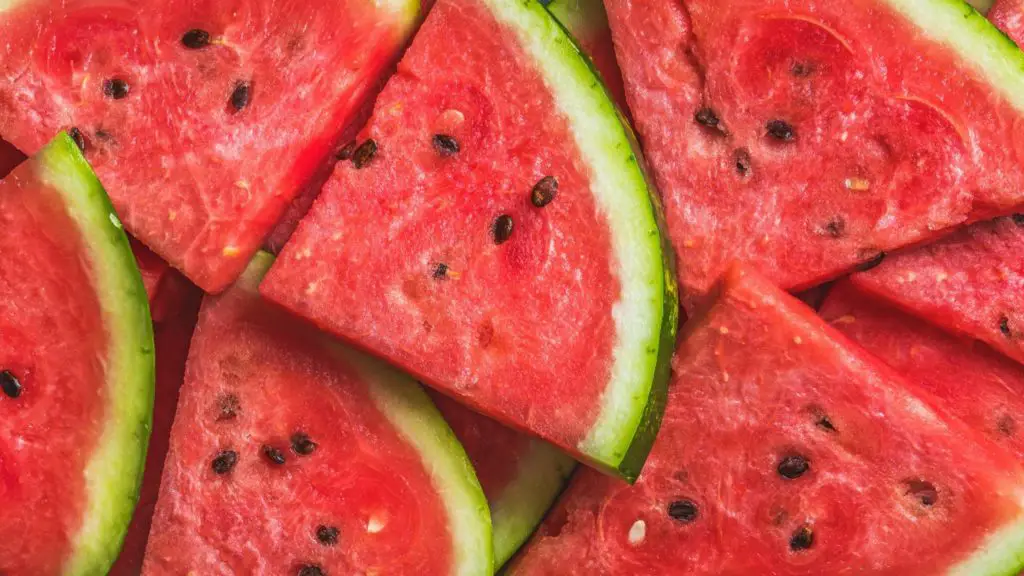
Can guinea pigs eat watermelon seeds?
From the outside, let’s now get to the seeds of the watermelon. Are seeds safe? No. It’s better to avoid feeding your guinea pig watermelon seeds because of choking dangers. Technically, the seeds are not toxic for guinea pigs. However, the seeds of a watermelon can cause your little guinea pig to choke.
Even if you think your adult guinea pig can handle swallowing the seeds, it’s still better to be safe than sorry. Never give your guinea pig any fruit seeds. Make sure to take out all the seeds in the portion of whatever fruit you’re feeding to your pet. By the same token, you can buy seedless watermelon instead.
Can guinea pigs have watermelon juice?
It’s already mentioned earlier in this article that watermelons also contain water aside from being tasty and fleshy but what about watermelon juice? Watermelon juice might be your favorite summer drink on the beach but the case is not the same for your guinea pig. Never give your guinea pig watermelon juice because it’s mainly concentrated with sugar which is hazardous for your pet.
Again, let’s emphasize the fact that too much sugar can cause obesity, diabetes, and hypertension to your beloved furry friend which might occasionally increase the risk of an early death.
Can baby guinea pigs eat watermelon?
It’s already a pretty obvious conclusion that baby guinea pigs will, of course, have a more sensitive digestive system than adult guinea pigs. Watermelon is good and is safe to be given to younger guinea pigs which are already a few months old. However, you should avoid giving even a tiny portion of watermelon to new-born or weeks-old guinea pigs.
During the time when they’re most vulnerable as babies, guinea pigs should feed more on their mother’s milk. Once they step to becoming three weeks old, they can begin drinking water and taking hay and pellets or supplements. Some of the best hay to give baby guinea pigs are alfalfa, timothy, orchard grass, and oat hay. The hay becomes the main source of protein and calcium which help in bone development.
Once your guinea pig grows to three months old, you can start introducing fruits and vegetables rich in vitamin C like watermelon. Start with giving the watermelon treat once a week and then gradually, you can go to twice or thrice a week.
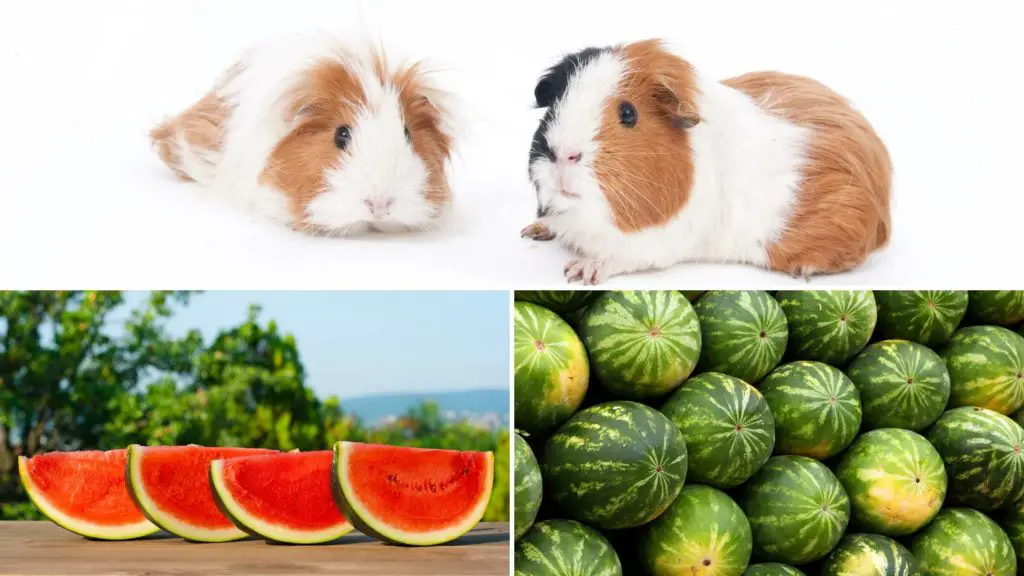
What can guinea pigs not eat?
Regardless of your guinea pig’s age, there are just some foods that you should avoid feeding your pet. Guinea pigs are herbivores and they will find joy in chewing green, leafy vegetables and tasty fruits but don’t let these dangerous foods fool you. These following fruits and vegetables may reflect the face of being fresh but don’t let it fool you.
Can guinea pigs eat tomatoes? No. Tomatoes carry toxins that are harmful to guinea pigs. As much as possible, also avoid vegetables like avocado, beans, potatoes, iceberg lettuce, garlic, paprika, rhubarbs, Christmas pepper and olives. Additionally, coconuts and cherries will give fruits a bad name as foods for your guinea pig so avoid putting them as well in your guinea pig’s snack bowl.
You should cross out other seeds from your list of potential diet plans for your guinea pigs. These include nuts, coffee, lilac, iris, jasmine, hydrangea and seeds of any kind. Meat is also not a wise option. Guinea pigs will be unable to digest these foods which can lead to more serious conditions such as choking.
What can guinea pigs eat?
To keep your guinea pig excited everyday, a different mixture of fruits and vegetables will most likely increase your furry pet’s appetite. Can guinea pigs eat grapes with seeds? Can guinea pigs eat strawberries? Can guinea pigs eat bananas? Aside from these, what fruits can guinea pigs eat? You’re about to find out!
Aside from mixing small chunks of watermelon, you can also include other fruits like grapes, strawberries, blueberries, bananas and pineapples. Just make sure that seeds are removed from the grapes and berries. You can add diversity and color to their bowl too by even adding asparagus, squash, cilantro, pumpkin and zucchini.
References:
- NY Times, ‘The Best 5 Summer Fruits, Ranked’, https://www.nytimes.com/2018/05/22/dining/best-summer-fruit.html, Accessed – 7 May 2021
- VCA Hospitals, ‘Health Problems in Guinea Pigs’, https://vcahospitals.com/know-your-pet/guinea-pigs-problems, Accessed – 7 May 2021

